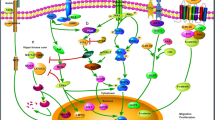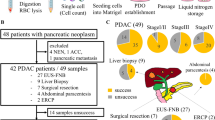Abstract
Background
Hepatoma-derived growth factor (HDGF) has been reported to play a pivotal role in the development and progression of several tumors. The aim of the present study was to analyze whether HDGF is a potential prognostic and diagnostic marker for extrahepatic cholangiocarcinoma (EHCC).
Methods
The immunostaining of HDGF was analyzed by immunohistochemistry for 65 pathologically confirmed EHCC, and its correlation with clinicopathologic factors and prognosis was investigated. Meanwhile, to evaluate the diagnostic value of HDGF, an enzyme-linked immunosorbent assay (ELISA) was performed to measure HDGF levels in the serum samples of 83 EHCC patients and 51 healthy controls.
Results
Positive expression of HDGF was detected in 30 (46.2 %) patients with EHCC and correlated with poor tumor differentiation (P = 0.024). Univariate analysis showed that the positive HDGF expression group had a significantly poorer survival rate than the negative HDGF expression group did (P < 0.001). Multivariate analysis demonstrated that HDGF expression and N stage were independent prognostic factors. The mean serum HDGF level in EHCC patients was 2.39-fold higher than that in healthy controls (P = 0.002). The optimal cut-off value for HDGF was 122.15 pg/mL, providing a sensitivity of 66.27 % and a specificity of 88.24 %. The area under the curve (AUC) of HDGF was 0.807 (95 % confidence interval 0.730–0.870), demonstrating that HDGF was a potential biomarker for EHCC.
Conclusions
HDGF was a valuable independent prognostic factor after curative resection in EHCC, and it provided an important basis for screening/treating high-risk patients. Meanwhile, our study indicated that serum HDGF levels can be used as a noninvasive and potential diagnostic marker for EHCC.




Similar content being viewed by others
References
Khan SA, Thomas HC, Davidson BR et al (2005) Cholangiocarcinoma. Lancet 366:1303–1314
Patel T (2006) Cholangiocarcinoma. Nat Clin Pract Gastroenterol Hepatol 3:33–42
Jarnagin WR, Shoup M (2004) Surgical management of cholangiocarcinoma. Semin Liver Dis 24:189–199
Nakamura H, Kambe H, Egawa T et al (1989) Partial purification and characterization of human hepatoma-derived growth factor. Clin Chim Acta 183:273–284
Nakamura H, Izumoto Y, Kambe H et al (1994) Molecular cloning of complementary DNA for a novel human hepatoma-derived growth factor. Its homology with high mobility group-1 protein. J Biol Chem 269:25143–25149
Everett AD, Lobe DR, Matsumura ME et al (2000) Hepatoma-derived growth factor stimulates smooth muscle cell growth and is expressed in vascular development. J Clin Invest 105:567–575
Kishima Y, Yamamoto H, Izumoto Y et al (2002) Hepatoma-derived growth factor stimulates cell growth after translocation to the nucleus by nuclear localization signals. J Biol Chem 277:10315–10322
Okuda Y, Nakamura H, Yoshida K et al (2003) Hepatoma-derived growth factor induces tumorigenesis in vivo through both direct angiogenic activity and induction of vascular endothelial growth factor. Cancer Sci 94:1034–1041
Yoshida K, Nakamura H, Okuda Y et al (2003) Expression of hepatoma-derived growth factor in hepatocarcinogenesis. J Gastroenterol Hepatol 18:1293–1301
Tsang TY, Tang WY, Tsang WP et al (2009) Mechanistic study on growth suppression and apoptosis induction by targeting hepatoma-derived growth factor in human hepatocellular carcinoma HepG2 cells. Cell Physiol Biochem 24:253–262
Meng J, Xie W, Cao L et al (2010) shRNA targeting HDGF suppressed cell growth and invasion of squamous cell lung cancer. Acta Biochim Biophys Sin (Shanghai) 42:52–57
Hu TH, Huang CC, Liu LF et al (2003) Expression of hepatoma-derived growth factor in hepatocellular carcinoma. Cancer 98:1444–1456
Ren H, Tang X, Lee JJ et al (2004) Expression of hepatoma-derived growth factor is a strong prognostic predictor for patients with early-stage non-small-cell lung cancer. J Clin Oncol 22:3230–3237
Uyama H, Tomita Y, Nakamura H et al (2006) Hepatoma-derived growth factor is a novel prognostic factor for patients with pancreatic cancer. Clin Cancer Res 12:6043–6048
Yamamoto S, Tomita Y, Hoshida Y et al (2006) Expression of hepatoma-derived growth factor is correlated with lymph node metastasis and prognosis of gastric carcinoma. Clin Cancer Res 12:117–122
Yoshida K, Tomita Y, Okuda Y et al (2006) Hepatoma-derived growth factor is a novel prognostic factor for hepatocellular carcinoma. Ann Surg Oncol 13:159–167
Yamamoto S, Tomita Y, Hoshida Y et al (2007) Expression level of hepatoma-derived growth factor correlates with tumor recurrence of esophageal carcinoma. Ann Surg Oncol 14:2141–2149
Hu TH, Lin JW, Chen HH et al (2009) The expression and prognostic role of hepatoma-derived growth factor in colorectal stromal tumors. Dis Colon Rectum 52:319–326
Carmeliet P, Jain RK (2000) Angiogenesis in cancer and other diseases. Nature 407:249–257
Hicklin DJ, Ellis LM (2005) Role of the vascular endothelial growth factor pathway in tumor growth and angiogenesis. J Clin Oncol 23:1011–1027
Mobius C, Demuth C, Aigner T et al (2007) Evaluation of VEGF A expression and microvascular density as prognostic factors in extrahepatic cholangiocarcinoma. Eur J Surg Oncol 33:1025–1029
Zhang J, Ren H, Yuan P et al (2006) Down-regulation of hepatoma-derived growth factor inhibits anchorage-independent growth and invasion of non-small cell lung cancer cells. Cancer Res 66:18–23
Mao J, Xu Z, Fang Y et al (2008) Hepatoma-derived growth factor involved in the carcinogenesis of gastric epithelial cells through promotion of cell proliferation by Erk1/2 activation. Cancer Sci 99:2120–2127
Lee KH, Choi EY, Kim MK et al (2010) Hepatoma-derived growth factor regulates the bad-mediated apoptotic pathway and induction of vascular endothelial growth factor in stomach cancer cells. Oncol Res 19:67–76
Ooi BN, Mukhopadhyay A, Masilamani J et al (2010) Hepatoma-derived growth factor and its role in keloid pathogenesis. J Cell Mol Med 14:1328–1337
Liu YF, Zhao R, Guo S et al (2011) Expression and clinical significance of hepatoma-derived growth factor as a prognostic factor in human hilar cholangiocarcinoma. Ann Surg Oncol 18:872–879
Zhang A, Long W, Guo Z et al (2010) Development and clinical evaluation of a multi-purpose mAb and a sandwich ELISA test for hepatoma-derived growth factor in lung cancer patients. J Immunol Methods 355:61–67
Weidner N, Semple JP, Welch WR et al (1991) Tumor angiogenesis and metastasis-correlation in invasive breast carcinoma. N Engl J Med 324:1–8
Ren H, Chu Z, Mao L (2009) Antibodies targeting hepatoma-derived growth factor as a novel strategy in treating lung cancer. Mol Cancer Ther 8:1106–1112
Yu Y, Shen H, Yu H et al (2011) Systematic proteomic analysis of human hepotacellular carcinoma cells reveals molecular pathways and networks involved in metastasis. Mol Biosyst 7:1908–1916
Patel AH, Harnois DM, Klee GG et al (2000) The utility of CA 19–9 in the diagnosis of cholangiocarcinoma in patients without primary sclerosing cholangitis. Am J Gastroenterol 95:204–207
Akdogan M, Sasmaz N, Kayhan B et al (2001) Extraordinarily elevated CA19-9 in benign conditions: a case report and review of the literature. Tumori 87:337–339
Acknowledgments
This work was supported by research grants from the Graduate Independent Innovation Foundation of Shandong University (No. yzc10131). We are indebted to Dr. Shuhai Li for excellent statistical work and are also grateful to Drs. Lutao Du and Yi Zhang for their technical assistance.
Author information
Authors and Affiliations
Corresponding author
Rights and permissions
About this article
Cite this article
Han, Y., Zhang, W. & Liu, Y. Identification of Hepatoma-Derived Growth Factor as a Potential Prognostic and Diagnostic Marker for Extrahepatic Cholangiocarcinoma. World J Surg 37, 2419–2427 (2013). https://doi.org/10.1007/s00268-013-2132-4
Published:
Issue Date:
DOI: https://doi.org/10.1007/s00268-013-2132-4




